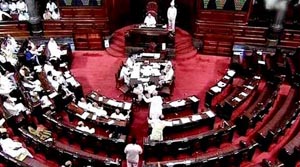New Delhi, Jul 15: The turmoil over the meeting of a journalist with terror mastermind Hafiz Saeed today stalled Parliament for the second consecutive day, with Government stating it has nothing to do with it and terming it as "diplomatic misadventure of a private individual".
Lok Sabha and Rajya Sabha saw disruptions as soon as the two Houses met for the day, with opposition Congress seeking suspension of Question Hour to get government's response over the "serious" matter.
Both Houses were again disrupted during the Zero Hour with Congress members expressing concern over the meeting and entering the Well raising slogans.
Finance Minister Arun Jaitley told Rajya Sabha that the government has nothing to do with either the visit or the meeting between Ved Pratap Vaidik and Saeed. "It is a diplomatic misadventure of a private individual," he said.
In Lok Sabha, External Affairs Minister Sushma Swaraj said government has nothing to do with a journalist meeting India's one of the most wanted terrorists Hafiz Saeed in Pakistan recently.
"Allegation that the government facilitated the journalist's meeting with Hafiz Saeed is false and baseless," Swaraj said.
The issue led adjournment of the Rajya Sabha twice and Lok Sabha once.
Jaitley said in the Upper House that the concerns of the Leader of the Opposition are also the concerns of the entire country.
"Yesterday, I clearly said in unambiguous terms that Government of India has nothing to do with either his visit or his meeting with someone whom we regard as a terrorist," he said.
"The person or his views has nothing to do with either the government or my party," Jaitley said leading to uproar with slogan-shouting Congress members storming the Well.
As soon as the Lok Sabha assembled for the day, Congress members led by Mallikarjun Kharge were on their feet demanding a reply from the government on the reported meeting of the journalist with Saeed, India's one of the most wanted terrorists who was also the mastermind of the 26/11 attack.
When Speaker Sumitra Mahajan declared that Question Hour will not be suspended, Congress members trooped into the Well shouting slogans like 'Vaidik ko mat bachao' (Don't save Vaidik), 'Home Minister jawab do' (Home Minister give reply), 'Hafiz ka sach batao' (Tell us the truth on Hafiz affairs).
Amid uproar, Jammu and Kashmir People's Democratic Party members Mehbooba Mufti and Tariq Hameed Karra too came to the Well protesting against the killing of "innocent" in Gaza due to the bombing by Israel.
They were carrying placards that read 'Gaza needs our voice', 'In solidarity with Gaza' and shouted slogans like 'Speak India Speak'.
Mahajan asked the members not to disturb Question Hour and warned the PDP members not to show placards as it was against the Parliamentary rules.
Earlier, Home Minister Rajnath Singh and Parliamentary Affairs Minister M Venkaiah Naidu said government would make a statement on the issue of journalist meeting Saeed only when the Chair allowed.
The Speaker told the opposition members not to take the House for granted by staging protests during Question Hour.
"Suspension of Question Hour is not done. Question Hour is for all the members. If you do not want the Question Hour, drop it. I do not have any objection. But do not make it (disruption) a precedent," she said.
Congress leader Kharge said they tried to raise the issue yesterday at least twice but in vain as there was no response from the government which forced them to stage protest today.
Members of Left parties too supported the PDP protest against Israel's bombing in Gaza and stood in the aisle demanding a reply from the government.
RJD member Rajesh Ranjan alias Pappu Yadav opposed the introduction of a new examination pattern by the Union Public Service Commission (UPSC) and asked the government to intervene.





Comments
Add new comment